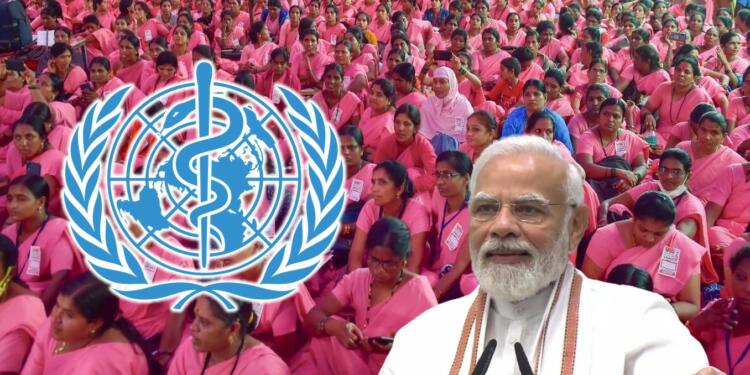Recognising the country’s 10.4 lakh strong Accredited Social Health Activists, or ASHA workers, the World Health Organization (WHO) on Sunday conferred the prestigious Global Health Leaders’ Award on the volunteer workforce, forming the backbone of India’s rural health infrastructure. The award was granted for their crucial role in providing direct access to healthcare facilities in rural areas and their indefatigable efforts to rein in the coronavirus pandemic in the country.
Taking to Twitter, WHO in a thread remarked, “ASHA – means ‘hope’ in Hindi. These health workers provide maternal care & immunization for children against vaccine-preventable diseases; community health care; treatment for hypertension & tuberculosis & core areas of health promotion for nutrition, sanitation & healthy living”
It added, “ASHAs worked to provide maternal care and immunization for children against vaccine-preventable diseases; community health care; treatment for hypertension and tuberculosis; and core areas of health promotion for nutrition, sanitation, and healthy living.”
ASHA – means 'hope' in Hindi. These health workers provide maternal care & immunization for children against vaccine-preventable diseases; community health care; treatment for hypertension & tuberculosis & core areas of health promotion for nutrition, sanitation & healthy living pic.twitter.com/uId27EqjO1
— World Health Organization (WHO) (@WHO) May 22, 2022
Prime Minister Narendra Modi also took to Twitter to congratulate the them by stating, “Delighted that the entire team of ASHA workers have been conferred the @WHO Director-General’s Global Health Leaders’ Award. Congratulations to all ASHA workers. They are at the forefront of ensuring a healthy India. Their dedication and determination is admirable.”
Delighted that the entire team of ASHA workers have been conferred the @WHO Director-General’s Global Health Leaders’ Award. Congratulations to all ASHA workers. They are at the forefront of ensuring a healthy India. Their dedication and determination is admirable. https://t.co/o8VO283JQL
— Narendra Modi (@narendramodi) May 23, 2022
Meanwhile, Health Minister Dr Mansukh Mandaviya also extended his warmest greetings to all the ASHA workers, “Congratulations to all the ASHA workers on being conferred the award. ASHA workers are at the forefront of healthcare delivery and played a key role in the country’s response to the prevention and management of the COVID-19.”
Congratulations to all the ASHA workers on being conferred the @WHO Director-General’s Global Health Leaders’ Award.
ASHA workers are at the forefront of healthcare delivery & played a key role in the country’s response to the prevention and management of the COVID-19. https://t.co/seMDNmlqEY
— Dr Mansukh Mandaviya (मोदी का परिवार) (@mansukhmandviya) May 23, 2022
Who are ASHA workers?
First established under the National Rural Health Mission (NRHM) in 2005, the ASHA workers are primarily married, widowed, or divorced women between the ages of 25 and 45 years. Over 98 per cent ASHAs belong to the village where they reside and know every household.
By knowing the entire villages like the back of their hands, these ASHA workers conduct a door-to-door campaign where they persuade the reluctant about being assimilated into the healthcare structure of the country. Moreover, they create awareness about basic nutrition, hygiene practices, and the health services available.
One of the major roles of ASHAs is to facilitate the institutional delivery of babies in the rural areas where women are still abhorrent to availing the facilities of a hospital. Later, they provide post-birth training on breastfeeding and complementary nutrition for children, whilst also informing the mothers about the contraceptive.
They are also tasked with screening for infections like malaria during the season. They also provide basic medicines and therapies to people under their jurisdiction such as oral rehydration solution, chloroquine for malaria, iron-folic acid tablets to prevent anaemia, and contraceptive pills.
It is pertinent to note that the ASHA workers are not doctors or trained nurses. However, they are imparted training to act as the bridge between the health care gap in places, both rural and urban, where such services were previously non-existent. They get performance-based payments, not a fixed salary like government servants.
As per the latest National Health Mission data, Uttar Pradesh (1.63 lakh), Bihar (89,437), and Madhya Pradesh (77,531) have the highest workforce of ASHA workers. Ideally, the aim is to have one ASHA for every 1,000 persons or per habitation in hilly, tribal or other sparsely populated areas.
Their role during the pandemic
By helping in the early detection of cases and spreading information on the prevention of the disease – ASHA workers were at the forefront during the coronavirus pandemic, helping supplement the Health Ministry’s efforts. The ASHA workers also helped in inoculating the masses which helped India undertake the largest vaccination drive in the world.
Their most critical roles were ensuring continued access to essential health services when hospitals ran out of beds and encouraging vaccination. Several ASHAs said they were beaten with sticks by angry villagers, who chased them away after rumours on social media that Covid vaccines had killed people or made them infertile.
Frequent attacks on ASHA workers
In May 2020, a complaint was filed against quarantined members of the Muslim community for allegedly threatening the ASHA workers. Nineteen members of the Muslim community were booked in Uttar Pradesh’s Mau. The ASHA had asked them to follow the quarantine norms. Agitated by suggestions, the members of the Muslim community had threatened to kill them.
Similarly, in April 2020, workers were attacked by members of the Muslim community in Darbhanga, Bihar. ASHA workers who had come to seek information about the residents with a travel history in the village were subjected to a brutal assault by members of the minority community. Sarees of the female ASHA workers were pulled by the miscreants while the survey form given by them was torn into pieces.
ASHA workers are the lifeline of rural India. Often forgotten by the personnel sitting in the plush urban offices, it’s high time that their efforts are recognised wholeheartedly and their wages and working conditions are improved.
























